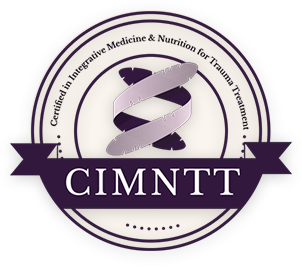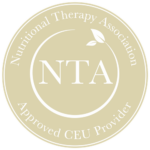
EARN 30 CE CREDITS NUTRITION

LEARN A FULL-SPECTRUM APPROACH THAT FOSTERS INTEGRATIVE HEALTH

ADVANCE YOUR CAREER
Helping Your Clients Recover from Trauma or PTSD Can Stretch Your Limits
Especially in the ocean of stress, anxiety, and isolation we live in. You probably have seen even dependable, evidence-based strategies break down, increasing the stumbling blocks in your practice. Or your clients have hit the limits of talk therapy.
It’s easy to feel like you’re not doing enough.
I noticed the same challenges over 45 years ago while working with severely ill, traumatized clients, and I started looking for ways to decrease my clients’ triggers while getting at their root causes.
Seeing a connection between what my clients were eating and how they were feeling, I pioneered ways to integrate nutrition into my practice — along with breathing exercises, yoga, and bodywork, which made my work more multifaceted as well as effective.
Until the Root Causes of Trauma are Addressed and Healed, Symptoms Will Continue to Flare Up
MORE ABOUT THE COURSE

Use a Healing Roadmap
Over 45 years, working with colleagues as diverse as indigenous healers in the jungle of Mexico and integrative doctors at Harvard Medical School, I developed a comprehensive integrative health and healing roadmap that you can personalize based on each client’s unique physical and psychological condition.

Evidence-Based Methodology
Known as The Brainbow Blueprint®, this approach to integrative health is a multipronged methodology that offers a wealth of natural, evidence-based ways to catalyze the body-mind’s innate healing response.

Integrating 16 Modalities
The Brainbow Blueprint® draws from a rich palette of ancient wisdom and modern techniques, respecting culturally sensitive needs. I offer you the depth of my experience, having road-tested and refined the application of 16 different types of modalities, from balancing biorhythms and hormones to selecting herbs, supplements, even psychedelics and entheogens.

Taper off Medications
Peer-reviewed journals confirm the lack of evidence for psychotropics to heal PTSD. I will guide you through the process of creating a Taper Plan for your clients and coach you through the ethics and coordination of working with the prescribers. I’ll even give you samples of how to talk to difficult prescribers.

Bodywork for Mental Health
Having worked with clients across the mental health spectrum, I will teach you exactly which types of breathing, yoga, bodywork, and other methods work for which clients and at which stage of recovery.

Create Personalized Care Plans
You’ll finish this deeply enriching certification course with a step-by-step process for creating personalized care plans that you can start to use right away.
Get Life-Changing Results
Using my methodology, I quickly discovered that my clients’ journey to healing accelerated and they experienced life-changing results — even when they were previously stuck.
I’ll teach you how to confidently leverage your work to treat mind and body together, so your trauma clients can find lasting relief and can finally reconnect to their healing and growth potentials.
Once you complete this training, you’ll qualify to immediately become Certified in Integrative Medicine and Nutrition for Trauma Treatment (CIMNTT) through the Leslie Korn Institute for Integrative Medicine.

Try Before You Buy
See if this certification program is the right fit for you. Click the button to start your first lesson.
No credit card required. It’s 100% on me!
Your Course Includes:
- An invitation to join my Live Advanced Applications program (coaching and case consultation)
- Your first year of certification is FREE (a $99.99 value)
- Your exclusive listing in our Referral Network
- Practical videos and handouts to use with your clients
- Nutritional recipes for your clients
- Clear assessment demonstrations
- Multiple case reviews


“Interesting, considered, and thorough program.”
Kathy Heuser, PsyD, LPCC

“Dr Korn’s understanding of trauma, culture and the development of health is like none other.”
Sandi Loytomaki

“I found your recent PTSD training to be one of the best I’ve attended.”
Mary VanNortwick, BS, MS, RDN, IFNCP

“Speaks to my soul.”
Melissa Fabreo-Montelongo
Frequently Asked Questions
If you are a mental health or physical health professional, this program will greatly benefit your outcomes.
The certification program has been specially developed to expand the professional expertise of psychologists, marriage & family therapists, social workers, case managers, addiction counselors, professional counselors, school clinicians, occupational therapists, occupational therapists’ assistants, massage therapists, nurses, nurse practitioners, physical therapists, nutritionists and registered dietitians, program administrators and other professionals.
There is no known commercial support or conflict of interest for this program.
We are a Preferred Provider with the Integrative and Functional Nutrition Academy (IFNA). The certification course “Integrative Medicine and Nutrition for PTSD and Complex Trauma” is approved for 30 Continuing Professional Education Units (CPEUs).
Once you complete your certification you may maintain this record and submit it to IFNA when required.
You may also check about submitting our certificate of completion directly for RD and Nutritional CPEUs to your local credentialing body. We encourage you to learn about your specific credentials requirements in advance.
We Are a Preferred Provider with The Nutritional Therapy Association (NTA). The certification course, “Integrative Medicine and Nutrition for PTSD and Complex Trauma” is approved for a total of thirty (30) health CEUs.
Once you complete your certification you may maintain this record and submit it to NTA when required.
Accessibility Policy: This program adheres to the standards of the Americans Disabilities Act. Please contact the Leslie Korn Institute for Integrative Medicine if special accommodation is required.
Grievances Policy: Leslie Korn Institute for Integrative Medicine seeks to ensure equitable treatment of every person and to make every attempt to resolve grievances in a fair manner. Please submit a written grievance to grievances_lkkim@protonmail.com. Grievances would receive, to the best of our ability, corrective action in order to prevent further problems.
American Psychological Association. (2017). Clinical Practice Guideline for the Treatment of Posttraumatic Stress Disorder. Available at: http://www.apa.org/ptsd-guideline/treatments/index.aspx
Bokhour, B. G., Haun, J. N., Hyde, J., Charns, M., & Kligler, B. (2020). Transforming the veterans affairs to a whole health system of care: time for action and research. Medical Care, 58(4), 295-300.
Brenner, L. A., Forster, J. E., Stearns-Yoder, K. A., Stamper, C. E., Hoisington, A. J., Brostow, D. P., … & Lowry, C. A. (2020). Evaluation of an immunomodulatory probiotic intervention for veterans with co-occurring mild traumatic brain injury and posttraumatic stress disorder: a pilot study. Frontiers in Neurology, 11, 1015.
Bondurant, S., Anastasi, J. K., Berman, B., Buhrmaster, M., Burrow, G. N., Chang, M., & Sox, H. (2005). Complementary and alternative medicine in the United States. Institute of Medicine.
Institute of Medicine, 2005. Complementary and Alternative Medicine in the United States. Washington, DC: The National Academies Press. https://doi.org/10.17226/11182
Bortolon, C., & Brand, R. M. (2021). Psychosis, trauma and dissociation: evolving perspectives on severe psychopathology: edited by Andrew Moskowitz PhD, Martin J. Dorahy PhD, Ingo Schäfer MD, MPH, Hoboken, NJ: John Wiley & Sons, 2018, (Hardcover) pp 455; Print ISBN: 9781119952855, Online ISBN: 9781118585948.
1. Define foundational terms of reference and disciplines which comprise the field of Nutritional & Integrative Medicine
2. Describe an integrative approach to the mind-body treatment of PTSD and complex trauma
3. Explain how to bridge theory and praxis/application for professionals who are or are about to integrate nutrition and advanced integrative approaches into practice
4. Discuss federal and state-level legal issues when practicing integrative medicine and nutritional therapies in a variety of settings
5. Identify the scope of practice for each participating profession
6. Incorporate ethics into the clinical practice of nutrition and integrative medicine
7. Review informed consent and disclosure forms in a clinical practice
8. Describe the psychological elements of trauma addressed by nutrition and integrative medicine
9. Define special needs of people with medical dental trauma
10. Identify clinical relational challenges working with “white collar trauma”
11. Review the new dissociative subtype as it influences SUD, pain and self-injury
12. Review dissociativity and state-dependent memory learning and behavior
13. Define hypnotherapy and its application to trauma sequela
14. Define psychological resilience research
15. Describe the biological and physiological elements of trauma addressed by nutrition and integrative medicine
16. Analyze the effects of chronic inflammation on depression, PTSD, and anxiety disorders
17. Describe research on autoimmune disease, PTSD, women and nutritional methods
18. List 3 ways in which traumatic exposure contributes to chronic fatigue
19. Review IM interventions to enhance energy production and reduce inflammation and pain
20. Identify and address the unique needs of different populations including LGBTQ+ and BIPOC communities
21. Describe cultural humility as a skill for enhanced results
22. Analyze the demographics of integrative medicine across populations
23. Explore the role of integrative medicine and nutrition as multicultural interventions
24. Investigate the impact of trauma on marginalized communities
25. Incorporate the DSM5 cultural formulation interview
26. Understand how traumatic events disrupt biological rhythms
27. Apply nutritional therapies for regulation of circadian rhythm
28. List CR interventions that regulate sleep and mood
29. Identify the role of hormones in trauma throughout the life cycle
30. Explore how nutrition and integrative approaches can address digestion challenges
31. Define the role of polyvagal theory in digestion
32. List 3 major digestive disorders correlated with complex trauma and nutritional interventions
33. Explain how to conduct a comprehensive, integrative medicine and nutritional therapy post-trauma assessment
34. List current integrative assessments of autonomic dysregulation
35. Review commonly used clinical tests that inform physical health affected by PTSD and trauma
36. Review ethics and scope regarding practitioners’ use of tests, assessments, and analyses
37. Discuss Genomics and personalized health tests for PTSD and complex trauma
38. Define stage-specific methods for engaging a client in food preparation for self-care and self-regulation
39. List the role of specific foods and diets and how they help or hinder autonomic balance
40. Present the science of food choices and their role in inflammatory process underlying depression and anxiety
41. Understand the clinical application of culture, ethnicity, and genomic testing to inform optimal nutrition for PTSD
42. Present application of diverse methods and diets that address the concept of personalized medicines
43. Apply foods and recipes to metabolism, ethnicity and genomics to inform optimal nutrition for PTSD
44. List the types of foundational and adjunctive supplements to restore psychobiological balance
45. Present amino acid therapy as a foundation for neurotransmitter support
46. Investigate the effects of neurohormones in mental health
47. Provide a drug-nutrient interaction database resource
48. Examine the science of herbal medicine for the reduction of anxiety and depression
49. Identify adaptogens, nervines, anti-inflammatory and antidepressant herbs
50. Identify the types of delivery systems for herbal medicine
51. Provide a drug-nutrient interaction database resource
52. Define phase 1 and phase two detoxification
53. List 3 ways in which detoxification improves mental health
54. Identify how different organs detoxify waste
55. Define 3 meanings of detoxification
56. Explore the management and tapering of pharmaceutical medications
57. Define the research on discontinuing pharma
58. Define the effects of psychotropics on nutritional status
59. Identify potential paths and outcomes for detoxing from pharmaceutical medications
60. Define application for collaboration with clients’ prescribers
61. Name 3 methods using hot and cold water therapies to address pain and anxiety
62. Demonstrate the benefits of yoga to reduce anxiety in children and adults
63. Demonstrate the yoga to enhance self-regulation and attachment in children and adolescents
64. Differentiate the application of different types of exercise to various symptoms
65. Define the relationship between disordered breathing and anxiety
66. Identify how changes in blood gases increase panic and anxiety, and methods to resolve
67. Demonstrate 6 innovative breathing exercises that extend beyond conventional methods to
address specific symptoms of right/left brain dysfunction
68. Discuss the science and methods of sound and music for PTSD and TBI
69. Define a model for integrating somatic methods for PTSD and complex trauma
70. Assess a range of methods for making appropriate stage-based referrals
71. Demonstrate rocking and hands-on methods to reduce autonomic hyperactivity and engage sleep
72. Explore the intersections of sensory processing, trauma, and somatics in children and adults
73. List the research foundations underlying 3 energy medicine applications: neurofeedback, cranial electrical stimulation, and photobiomodulation
74. Define practice and methods for at home or referrals for energy medicine
75. Incorporate sound therapies to address sleep, pain, and anxiety
76. Define 3 methods of ecotherapy that reduce autonomic reactivity
77. Identify nature interventions that reduce dissociation
78. Explain nature-based stress inoculation and resilience strategies for individuals and groups
79. Assess for the specific type of ecotherapy intervention for stage-based recovery
80. Define clinical research on how human-animal interaction enhances self-regulation and attachment capacity in children and adults
81. Explore the role of integrating touch of animals into treatment with individuals traumatized by inappropriate touch
82. Discuss canine therapy and equine therapy and their role in recovery from PTSD and complex trauma
83. Define terms of psychedelic medicines
84. Identify altered states that are either healthy or unhealthy and engage methods to restore healthy states
85. Define a psychoeducational language for clients interested in knowing more about psychedelic methods
86. Identify categories and types of psychedelic medicine
87. Name how psychedelic medicine is theorized to support trauma recovery
88. Explore client readiness psychedelic medicine through the assessment process
89. Define the relationship between psychedelics and the sacred journey
90. Investigate the differences between medical and traditional methods
91. Explore access and diversity issues in psychedelic medicine
92. Identify the role of integrative methods in post-traumatic growth
93. Define transpersonal psychology and thriving
94. Assess for post-traumatic growth
95. Define the concept of the wounded healer and its relationship to integrative medicine
96. Define demographics of religion in USA
97. Define the specific outcomes of wounding by spiritual professionals and clinical methods
98. Explain rituals psychobiologically and their role in trauma recovery
99. Define adaptive and maladaptive aspects of dissociation and trance
100. Identify the role of learned helplessness and positive psychology in adherence
101. Incorporate components of motivational interviewing as a tool for adherence
102. Define coaching strategies, like SMART to help clients set and achieve goals
103. Review the development and delivery of a protocol for health
104. Create a treatment plan for the client based on the Brainbow blueprint
105. Apply cumulative skills to develop a plan for delivery of treatment, client education, and goal achievement
106. Utilize a phase-specific approach to integrating methods
107. Identify the strategies, support, and time needed for making changes and preventing relapses
Certification is easy and simple. Start with completing one of my three certification programs. As a licensed provider, once you successfully complete a program and achieve a minimum of 75% on the post-test, you may submit your application for certification here
It’s free for the first year.
If you are not licensed but believe that your background and work qualify you for certification, we offer an alternative pathway by which to apply. Use the same process above; in the application form, you will be asked to upload additional supporting materials.
And of course, our staff is available to support your application submission should any questions arise; just contact us
There are options to work with me directly.
You may choose a Health Consultation for your own health and to see how to conduct the Brainbow Blueprint® model in practice.
I also offer Practice Building and Career Counseling to think through your career goals in integrative medicine and nutrition for mental health.
Whatever way you prefer to connect with me, know that I am passionate about supporting you and your personal and professional goals!
You can start the course immediately! It is a completely self-paced online course — you decide when you start and when you finish. Once you have completed the course you can claim CE credits and apply for your free certification.
How does lifetime access sound? After enrolling, you have unlimited access to this course for as long as you like — across any and all devices you own.
If you are not 100% satisfied with this course you may send an email and you will be provided with a full refund, no questions asked. The reimbursement given will be minus taxes and fees paid.
You wish you could really help your trauma clients and finally reconnect them to their innate healing potential…

The Curriculum Covers In-Depth…
- An integrative approach to mind-body treatment of PTSD and complex trauma
- A better understanding of the new dissociative subtype as it influences SUD, pain and self-injury
- The definitions of dissociativity and state-dependent memory learning and behavior
- The effects of chronic inflammation on depression, PTSD, and anxiety disorders
- Describe research on autoimmune disease, PTSD, women and nutritional methods
- How to apply cultural humility as a skill for enhanced results
- Understand how traumatic events disrupt biological rhythms
- How to apply nutritional therapies for regulation of circadian rhythm
- The role of polyvagal theory in digestion
- Current integrative assessments of autonomic dysregulation
- Herbal Medicine
- Detoxification & Hydrotherapy Strategies
- Exercise, Yoga, Breath & Sound
- Somatics, Bodywork, & Energy Therapies
- Nature & Human/Animal Bond
- Entheogens & Psychedelic Medicine
- Spirituality, Post-Traumatic Growth & Transformation of Trauma
- The Roadmap to Health Enhancing Adherence & Motivating for Success
What’s My Investment
COURSE & CERTIFICATION
$299
$1279
Join the 35,000+ professionals who completed Dr. Korn’s certification programs
I’VE BEEN FEATURED, INTERVIEWED, OR PROFILED IN:







Course Description
This certification program offers the most comprehensive online training on PTSD and Complex Trauma using integrative medicine and nutrition available, anywhere. The course teaches practical, integrative, and nutritional interventions that can be combined with trauma-specific modalities.
Whether you are a mental health clinician working with clients who have chronic illnesses like memory loss, and cognitive decline, or a physical health or nutrition provider preventing and diabetes and dementia, who wants to add to your toolbox, you will find methods that ensure your patient outcomes will improve.
You will learn an integrative approach that equips you with the knowledge, skills, and tools to combine evidence-based clinical methods using functional medicine, culinary and herbal medicine, naturopathic medicine, massage, and visceral manipulation, yoga therapies, and psychological methods with conventional, allopathic, biomedical science and clinical interventions.
This certification gives you what you require to safely recommend supplements and herbs, and to help clients reduce or optimize current medications. You will study the role of traumatic stress and how it affects memory and cognition, and you’ll spend time in the kitchen learning to prepare herbs and foods.
We can give our best advice to clients and patients, but without adherence to the protocols, any method will fail. Therefore I explore the role of motivational interviewing to address self-care and compliance.
Memory loss, agitation, gastroparesis, neuropathy, sundowning, and much more are all explored in depth using natural medicine and functional methods that reduce side effects, thus giving you many options for helping your patients or clients. You’ll also explore caregiver health, cultural and social justice, and how to build rapport with cultural competency.
When you complete your certification you will join others who are leading the revolution in integrative medicine and nutrition for chronic illness.

Your Instructor
Dr. Leslie Korn, PhD is a renowned expert in integrative medicine for the treatment of trauma and its physical sequelae including chronic digestive illness, insomnia, pain, substance abuse, diabetes, cognitive decline and “unexplained illnesses.” She has provided over 65,000 hours of clinical care integrating psychotherapy and somatic therapies with nutritional, culinary and herbal medicine. She completed her training at Harvard Medical School and The Harvard School of Public Health. She is licensed and board certified in 4 clinical disciplines.
She has been a faculty instructor at Harvard in the department of psychiatry and faculty at 2 Naturopathic medical schools. She lived for 25 years in the jungle of Mexico, where she worked alongside indigenous healers and directed a pro bono health center. Her clinical practice focuses on helping clients who are ill by restoring their health and reducing or eliminating medications.
Her mentoring practice focuses on helping clinicians create a successful, integrative medicine, trauma-informed career. Her ethic of compassion and care is informed by feminist values of social justice and her love for dogs.
Licensure: LMHC, MA. Lic #3214, exp. 12/2023; NPI: 1629659636
Additional Specialists

Jill Charney, LICSW is a school guidance counselor and clinical supervisor specializing in trauma and attachment disorders in children for 30 years in the urban Boston School system. Jill is an accomplished yoga instructor for children.

George Moscona, MA, LPPC has been in clinical practice for adults and as a school counselor for over 35 years. He specializes in the sacred journey of psychedelic medicine.

Candace Hammer Chaney, RN, CHPN, PHD has been a leading voice for over 20 years in providing CAM/integrative therapies at end of life. Director of CAM Therapies she is Director of Integrative Health Services for LHC Group, national providers of home health and hospice care.

Gary Ferguson, ND, Licensed Naturopathic Physician. He specializes in natural and integrative approaches to integrating culture and cultural practices to resolve PTSD and addictions. He is at the Institute for Research and Education to Advance Community Health at Washington State University. Gary is Aleut/Unangan, from Alaska.
The Leslie Korn Institute For Integrative Medicine is neither a regulatory nor licensing organization and therefore not sanctioned to certify, license, or otherwise bestow the legal authorization to practice as a nutritionist, physician, or mental health professional. Certification does not warrant that a program or its examination certifies a candidate’s competence. Nothing about this program or its examination is intended to replace, override, or conflict with licensing requirements for health professionals and their requirements for practice in their state of residency and practice.

Become a Certified Integrative Medicine Provider in PTSD, Complex Trauma, and Traumatic Brain Injury










